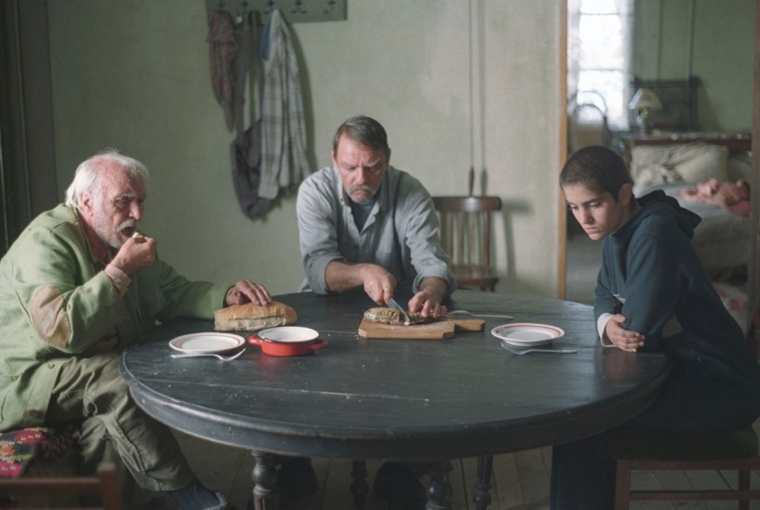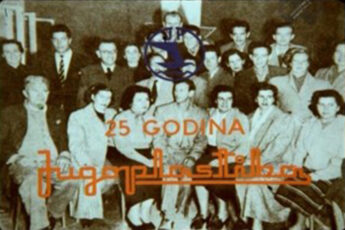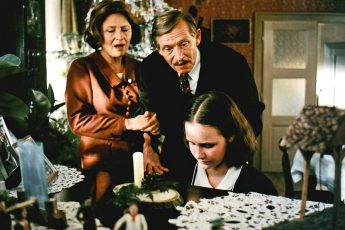Patriarchal Power and the Foreigner
Ruxandra Zenide’s Ryna (2005)
Vol. 8 (August 2011) by Ana Ribeiro
Ruxandra Zenide is one of the very few female filmmakers part of the Romanian New Wave’s scene. In this predominantly masculine world, she stands out with two films that deal with questions central to contemporary Romanian society. Her first feature film, Ryna, is about the coming of age of a 16 year-old girl in one of Romania’s more abandoned regions. This is not the change from a fairytale world into the troubles of maturity; Ryna’s (Doroteea Petre) environment is depicted in dark tones, never in pink. Indeed, things seem rather bleak for Ryna. Her father forces her to look and behave like a boy: She has her hair shaved, wears overalls that hide the contours of her body, and works as a mechanic in her father’s garage. Nonetheless, Ryna could hardly be considered a tomboy. And that’s where her problems start.
Instead of hiding her blossoming sexuality, she uses her femininity to revolt against her father’s imposition. She openly flirts with the young postman of the village and keeps “treasures” in a box – a pair of earrings are among her cherished goods. She also wants to go to the local fair for the first time, what can be interpreted as a rite of passage for the young lady. This event needs some preparation: Ryna wants to let her hair grow a bit longer before going there.
Every tentative to affirm her femininity is, however, undermined. In spite of her claims and the support of her mother to let her hair grow, her father shaves her head himself and forbids her to go to the village’s party. On another occasion, she tries to pierce her ears, but being hemophiliac, she ends up in the hospital. In one way or another, Ryna is always punished whenever she tries to assert herself as a woman.
Ryna’s alcoholic father doesn’t want his daughter to turn into a woman in order to protect her. True, sex seems to be the major drive of all men around her except for her supportive and caring grandfather, who, like her mother, is too weak to really protect her. The postman, claiming he loves her, wants to make love to her (and that is the reason he says he doesn’t “do it” with his girlfriend); in the scene where her father shaves her head, a group of young men is hiding nearby to spy on her naked, since her overalls are down. Even though the image of Ryna in that scene is very unsexy, the voyeurism of the young men endows her body with erotic qualities. The town’s mayor also has a dangerous sexual interest in the young girl, as does the French anthropologist who came the the town to do research.
Ryna is preyed by the men who are not in her family, while her family fails to protect her. Her father’s alcoholism even exposes Ryna to the lusty men in town, since she has to pick him up at the local bar on week-ends to drive him home. The mother is both physically and emotionally too weak to face her husband and encourage her daughter’s totally normal behavior: her only act of rebellion is to escape to Bucharest, leaving Ryna even more unprotected. The grandfather, physically fragile and mentally confused, can do little for his grandchild. Even the postman, who really seems to have feelings for her, is more driven by jealousy then by the desire to protect his beloved.
The only person somehow supporting Ryna’s femininity, is the wife of the local doctor. She offers Ryna the old dresses of her daughter and agrees to let her pick them up whenever she wants them, knowing the girl cannot take them home.
In the end, Ryna defies her father’s authority and surreptitiously goes to the village’s fair on her own. With the help of the doctor’s wife, she dresses up in pink and openly flirts with the French anthropologist, which stirs the postman’s jealousy. Blinded by his fury, he denounces Ryna to her father, which inadvertently leads to a serious act of aggression towards the girl. The father goes to town to look for her, but runs into the mayor before he can find her. As he needs the authority’s help in order to get a permit to run his gas station, he is seduced by the mayor’s proposal to have some drinks. Meanwhile, Ryna flirts, dances and goes for a walk with the French man. They kiss, and unexpectedly, he respects her decision to go home.
Knowing her father is drunk in town, Ryna once again gets into her old overalls to rescue him. She picks him and the mayor up, but the latter had, in fact, set a trap for the teenager. They find a reason to stop Ryna’s father’s van on their way home. The mayor leaves his drunken friend in a field near the road and goes back to the van, where he rapes the girl. In shock, she manages to get home. Her grandfather immediately understands the situation. As her father returns home, he pretends that nothing had happened, treating Ryna like a small child – the little boy he never wanted to grow up.
When inquired by the police, however, Ryna does not denounce the mayor, so that her father can get his desired permit. Nonetheless, on her way home, she bursts in anger, and beats up the postman who had let her down. He does not react, perhaps for knowing his mistake. Her last act is to leave the town to meet her mother in the capital city. In this scene, by the end of the film, she disrupts the role the women – mostly her and her mother – had in the film so far: they were the victims in an environment dominated by men. According to Ruxandra Zenide, Romania’s countryside is still paternalistically organized. The film, however, is not a simple and shallow exaggeration of the place of women in Romanian society.
Although Ryna deals with gender matters – how can a girl grow up into a confident woman in an environment where men still represent the dominating authority ? – it also asks broader political questions. For the filmmaker, Ryna became a representation of Romania itself. Like Ryna, Romania is a country torn between archaic political obscurantism, and the strong will to adapt to transparent democratizing standards.
The impotence towards the foreigner is most clearly depicted by the character of the French anthropologist, who arrives in the small town for his thesis on the origins of Romania’s Latinity. Although his hypothesis that the origins of Latin people are in Romania, which would invest the region with some power, he acts very much like an old-school scientist studying the “strange” people of the colonized countries: he uses the authority of being foreign in order to take pictures and measures the local people in a way that borders on racial discrimination. Whenever there’s an obstacle to his “scientific” goals, he offers to pay; the locals mistake him for a medical doctor. His interest in Ryna, in spite of her masculine looks, can also be seen as a perverse attempt to understand the “latinist” people he is looking for by dominating them sexually.
The foreigner disturbs the local society: he arrives in order to acquire knowledge, but he is also a curiosity for the people in the town. Ryna’s interest in him might also reflect her own dreams about foreigners, her hopes in being somewhere else. The French would bring something culturally “better” or at least different to her dismal life. In the narrative of the film, however, he also has a role in Ryna’s rape. After all, it’s Ryna’s interest in the foreigner and her rejecting of the postman that makes the latter meanly denounce her to her father, therefore making place for the mayor’s trap.
The theme of disrupting foreigners was already present in Zenide’s short-film Green Oaks (2003). In this film, a Swiss couple arrives in a poor Romanian orphanage in order to adopt a little girl. However, due to an error made by Romanian authorities, they find out that they actually cannot adopt the child they had chosen: little Gabi cannot be separated from her protective older brother, who is also in the institution. The problem is easily solved by bribing the director of the orphanage, who then closes his eyes to the mistake, allowing them to take Gabi to Switzerland.
Her brother, though, smart enough to understand what is happening, flees with his little sister in a desperate attempt not to let her go. Only when he realizes that Gabi will have more chances leaving with the Swiss couple and that the Swiss lady has real feelings for the little one, he gives in and allows them to take his sister.
In this film, as in Ryna, the foreigner disrupts the already broken environment. Their characters are dubious. Their behaviour makes us believe that they will be the villains: they treat the Romanians as objects they can use (for research), or to substitute what they are lacking (children). But while this might harm the local microcosm, the Romanians are not innocent: the mayor is the one who rapes Ryna, an action that is facilitated, if not provoked, by the postman’s and her father’s attitudes; Gabi is separated from her brother because the director of the orphanage accepted to be bribed.
Green Oaks and Ryna clearly show the exponents of a richer Europe that come to the East to highlight problems already there, such as paternalism or corruption. The first aspect is a constant in the portrays of women in Romanian New Wave’s films, and reminds us of the protagonists of Cristian Mungiu’s 4 Months, 3 Weeks, 2 Days, Bobby Paunescu’s Francesca or Tudor Giurgiu’s Lovesick. The theme of corruption and abuse of authority is also underlined in other films such as Cristian Nemescu’s California Dreamin’ or Catalin Mitulescu’s How I spent the end of the world.
In this sense, both films directed by Zenide are coherent with the trend of contemporary Romanian cinema, showing the uglier aspects of Romanian society. Zenide delicately raises harsh questions about the future of a country that has a hard time joining the new Europe. It is apparent that the suffering of her protagonists reaches beyond their individual sphere. Ryna’s and Gabi’s fate is, in the end, a metaphor for Romania itself.




Leave a Comment